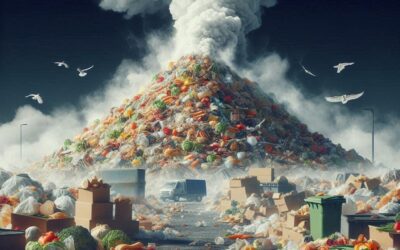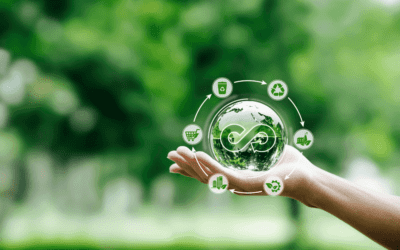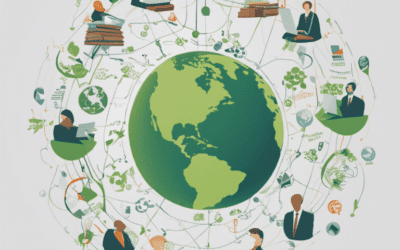There are many different types of waste. Each one has its own devastating impact on the environment. Sometimes that impact is visible – such as plastics in our rivers or oceans – and sometimes it is invisible – such as chemicals that leach into the soil.
The nature and significance of this impact cannot be underestimated. Waste is one of the largest contributors to greenhouse gas emissions, and therefore to the overall climate crisis. In this article, we’ll look at the various types of waste and what the hidden impacts are on our planet.
It’s difficult to get clear numbers on the amount that overall waste contributes to the climate crisis. Some estimates say that landfill waste, for example, will account for 10% of greenhouse gas emissions by 2025. And, according to wildlife charity WWF, the waste from the UK agriculture industry accounts for 10% of the industry’s emissions in the UK.
Breaking down all the potential waste sources is complex. For agriculture alone, the waste streams include:
- Animal waste
- Food and meat processing waste
- Crop production waste
- Animal and crop medical and treatment waste
- Industrial agricultural waste
- Chemical waste
And in construction – everything from housebuilding to major infrastructure projects, there are also many types of waste:
- Brick
- Concrete
- Ferrous materials
- Masonry
- Plastics
- Timber
- Paint, sealant and other coverings
- Insulation materials
In domestic waste, as well as general household waste, electronic and electrical waste has a big impact on the planet. This includes things like:
- Phones and tablets
- Laptops and desktop computers
- Kitchen electrical items
- White goods, such as freezers and washing machines
This only highlights general waste in three specific areas. When you also start to consider industrial waste, plastic waste and general food waste, you can start to see the scale of the problem we are facing.
The top three hidden consequences of waste
1. Electronic waste
E-waste is an increasing problem for the planet. While recycling and repurposing of electrical and electronic items is in place in many countries, it relies on consumers or businesses to send devices for recycling – and for that recycling to be properly managed.
Where electronics end up in landfill – and a 2022 report on the BBC suggested that in one year alone, 5.2 billion phones went into landfill – there are hidden consequences. Devices usually contain a range of materials – an iPhone, for example, contains:
- Metal
- Plastic
- Aluminium
- Copper
- Lithium
- Silver
- Gallium
- Arsenic
- Rare earth elements, such as lanthanum or neodymium
When it sits in landfill, your phone releases harmful gasses into the air, the soil and the water supply. Many of the elements used in electronic devices are toxic, so although they may look harmless, over time they have a significant environmental impact. And, as we are encouraged to change or upgrade our devices more regularly, the amount of waste increases.
Frustratingly, there’s a great circular economy opportunity with electronics. The materials used are valuable and can be reclaimed and reused. Our advice? Change your devices less often, resell old devices to prolong their lifespan and if there’s no other option than to get rid of them, make sure you do it responsibly to a recognised recycling operation.
2. Food waste
A particular problem in developed countries, food waste is not only unnecessary – it’s hugely damaging to the environment. For the purposes of this article, we’re looking at domestic food waste, rather than the waste associated with food production.
In the UK, households are the biggest contributors to food waste. While the amount of food waste produced in the UK fell by 15% between 2007 and 2018, according to the government, we still produced 9.5 million tonnes of food waste in 2018.
Many local councils now operate a food waste collection, which, alongside educating retailers and shoppers about sensible buying and food use, has helped to raise awareness of the issue. However, there is still a huge amount of food being taken to landfill – and this is a real problem for the environment.
According to a report from the Waste and Resources Action Programme, those 9.5 billion tonnes of food waste create around 36 million tonnes of carbon dioxide equivalent – this is 8% of the UK’s total emissions for the year 2018.
We may think that food breaks down in landfill, the way it might in a compost bin, and so you can’t see the problem – or perhaps you don’t think there is one. But as it breaks down, it releases gasses like methane and carbon dioxide.
When these gasses end up in the atmosphere, they contribute to what’s known as the greenhouse effect – trapping heat from the sun and causing warming.
So, the less food waste we send to landfill, the less harmful gasses we release into the atmosphere.
3. Plastic waste
Plastic waste has such a broad negative impact on the environment that it’s impossible to cover it in an article like this. However, the hidden consequences of plastic waste are critical to the planet’s – and our own – health, and we need to highlight the fact that our attitude to plastic waste over the years now means that virtually everything on the planet is contaminated with plastic in one way or another.
- The amount of plastic in our oceans means that the fish we eat are contaminated, and the biodiversity of the oceans has been compromised.
- Plastics in freshwater sources means that our drinking water is contaminated.
- Plastics in general water sources means that fruit, vegetables and other crops that are watered will have plastic contamination.
- Consuming contaminated food and water has consequences for our own health.
- Throwing plastics away contaminates the soil, damages animal and bird health and irrevocably damages our environment for the future.
At ISB Global, we focus on helping the waste and recycling industry to manage these issues responsibly. By using our technology to improve collections, focus on reuse and recycling and drive secondary markets and a circular economy, we are dedicated to being part of a drive to send zero waste to landfill in the future.






